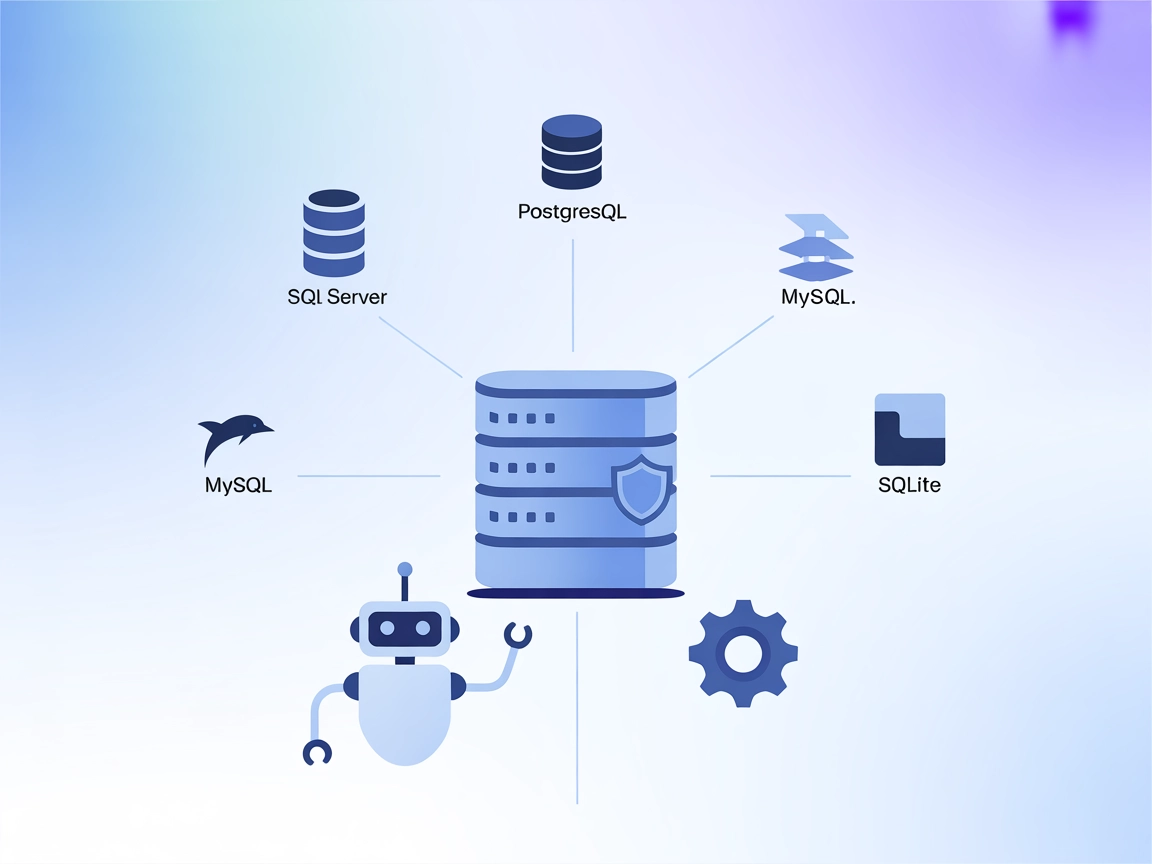
ModelContextProtocol (MCP) Server Integration
The ModelContextProtocol (MCP) Server acts as a bridge between AI agents and external data sources, APIs, and services, enabling FlowHunt users to build context...

Bridge your AI tools and GibsonAI projects with the GibsonAI MCP Server—manage databases, schemas, and deployments using natural language in your favorite development environments.
FlowHunt provides an additional security layer between your internal systems and AI tools, giving you granular control over which tools are accessible from your MCP servers. MCP servers hosted in our infrastructure can be seamlessly integrated with FlowHunt's chatbot as well as popular AI platforms like ChatGPT, Claude, and various AI editors.
The GibsonAI MCP (Model Context Protocol) Server serves as a bridge between AI assistants and your GibsonAI projects and databases. It allows MCP-compatible clients—such as Cursor, Windsurf, Claude Desktop, and others—to perform a wide range of project and database management tasks using natural language instructions. By leveraging GibsonAI MCP Server, users can create new projects, design and modify database schemas, execute SQL queries, manage deployments, seed tables with mock data, and more, all directly from within their favorite development environments. This integration streamlines the development workflow, enabling seamless interaction with databases and project resources through conversational AI.
Windsurf → Settings → Windsurf Settings → CascadeAdd server in the Model Context Protocol (MCP) Servers section.Add custom server in the modal dialog.{
"mcpServers": {
"gibson": {
"command": "uvx",
"args": ["--from", "gibson-cli@latest", "gibson", "mcp", "run"]
}
}
}
Note: Secure API keys and sensitive environment variables via your system’s environment configuration.
Claude → Settings → Developer and click Edit Config.claude_desktop_config.json file.{
"mcpServers": {
"gibson": {
"command": "uvx",
"args": ["--from", "gibson-cli@latest", "gibson", "mcp", "run"]
}
}
}
Note: Secure API keys via environment variables where appropriate.
Cursor → Settings → Cursor Settings → MCP Tools.New MCP Server.{
"mcpServers": {
"gibson": {
"command": "uvx",
"args": ["--from", "gibson-cli@latest", "gibson", "mcp", "run"]
}
}
}
Note: Secure API keys via environment variables.
.vscode/mcp.json file:{
"inputs": [],
"servers": {
"gibson": {
"type": "stdio",
"command": "uvx",
"args": ["--from", "gibson-cli@latest", "gibson", "mcp", "run"]
}
}
}
Note: Secure API keys using environment variables.
{
"mcpServers": {
"gibson": {
"command": "uvx",
"args": ["--from", "gibson-cli@latest", "gibson", "mcp", "run"],
"env": {
"GIBSON_API_KEY": "${GIBSON_API_KEY}"
},
"inputs": []
}
}
}
Using MCP in FlowHunt
To integrate MCP servers into your FlowHunt workflow, start by adding the MCP component to your flow and connecting it to your AI agent:

Click on the MCP component to open the configuration panel. In the system MCP configuration section, insert your MCP server details using this JSON format:
{
"gibson": {
"transport": "streamable_http",
"url": "https://yourmcpserver.example/pathtothemcp/url"
}
}
Once configured, the AI agent is now able to use this MCP as a tool with access to all its functions and capabilities. Remember to change “gibson” to whatever the actual name of your MCP server is and replace the URL with your own MCP server URL.
| Section | Availability | Details/Notes |
|---|---|---|
| Overview | ✅ | Description of GibsonAI MCP server found. |
| List of Prompts | ✅ | Prompt templates provided as examples in README. |
| List of Resources | ✅ | Descriptions inferred from features and task listings. |
| List of Tools | ✅ | Tool functions described in README feature list. |
| Securing API Keys | ✅ | Example JSON with env section provided. |
| Sampling Support (less important in evaluation) | ⛔ | No mention of sampling support. |
Based on the tables above, GibsonAI MCP Server scores highly for documentation and feature clarity, but lacks explicit mention of advanced MCP features like sampling and roots. It provides practical setup guidance and a reasonable set of tools/resources for most development workflows.
The GibsonAI MCP Server is well-documented and easy to set up for several popular AI development platforms. While it covers essential project and database management use cases, it does not mention support for advanced MCP features such as sampling or roots, which may limit some agentic or boundary-aware workflows. Overall, it is a solid and practical MCP server for developers working with GibsonAI projects.
| Has a LICENSE | ⛔ |
|---|---|
| Has at least one tool | ✅ |
| Number of Forks | 4 |
| Number of Stars | 9 |
The GibsonAI MCP Server serves as a bridge between AI assistants and your GibsonAI projects and databases. It allows you to manage projects, database schemas, SQL queries, deployments, and more using natural language, directly from supported development environments.
You can create and modify database schemas, generate mock data, execute SQL queries, manage deployments, and explore project structures—all through conversational AI prompts.
Follow the provided setup guides for Windsurf, Claude, Cursor, or Cline. Typically, you add a server entry to your configuration with the command: 'uvx --from gibson-cli@latest gibson mcp run'.
Always store sensitive information like API keys in environment variables, and reference them in your MCP server configurations instead of hardcoding them.
No, the current documentation does not mention support for advanced MCP features such as sampling or roots.
Streamline your AI-powered development workflow: connect your GibsonAI projects and databases to FlowHunt and other popular AI assistants using the GibsonAI MCP Server.

The ModelContextProtocol (MCP) Server acts as a bridge between AI agents and external data sources, APIs, and services, enabling FlowHunt users to build context...

The MCP Database Server enables secure, programmatic access to popular databases like SQLite, SQL Server, PostgreSQL, and MySQL for AI assistants and automation...

The Model Context Protocol (MCP) Server bridges AI assistants with external data sources, APIs, and services, enabling streamlined integration of complex workfl...
Cookie Consent
We use cookies to enhance your browsing experience and analyze our traffic. See our privacy policy.